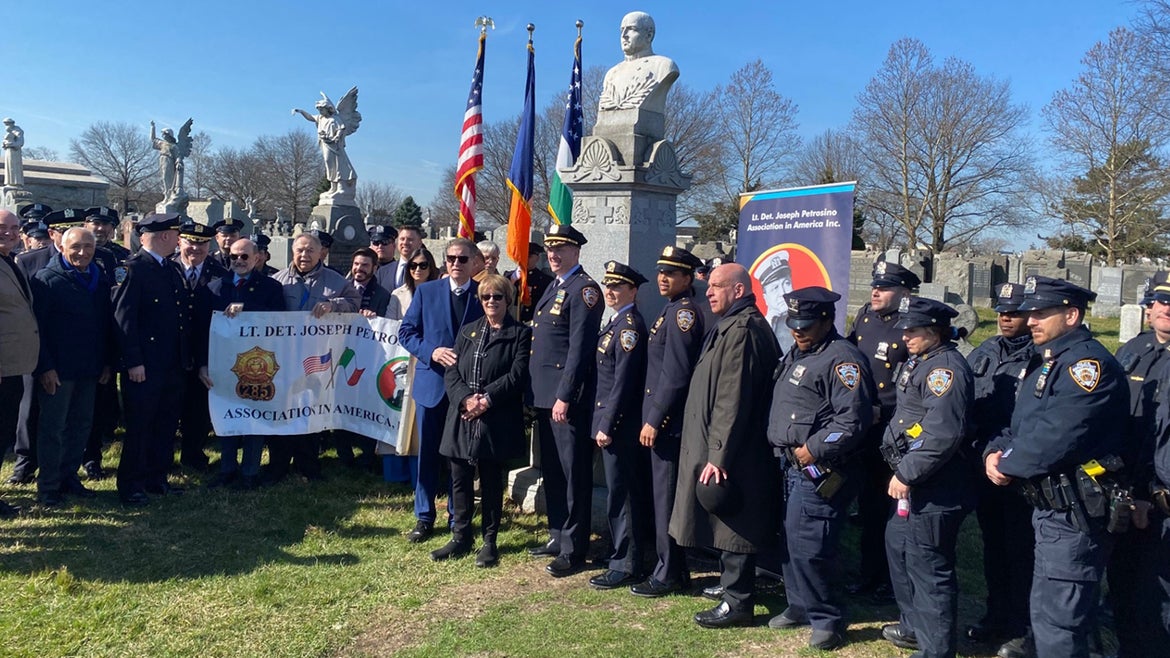On March 12, 1909, while on a secret mission in Palermo, Sicily, NYPD Lt. Det. Joe Petrosino was murdered by members of the island’s criminal underworld.
Members of the NYPD top brass, New York City dignitaries and family members of Lt. Detective Giuseppe “Joe” Petrosino gathered at his grave in Calvary Cemetery in Queens on Tuesday to mark 115 years since his murder.
Joe Petrosino was an immigrant who believed in the American dream and worked his way up the ranks of the NYPD to become the first Italian detective. He led a special task force called the Italian Squad, which was hellbent on taking down the Mafia and a group known as the Black Hand.
On March 12, 1909, while on a secret mission in Palermo, Sicily, Petrosino was murdered by members of the island’s criminal underworld. He remains the only active NYPD officer ever killed in the line of duty while overseas. His death remains unsolved.
"Mai dimenticare," which means "never forget" in Italian, Monsignor David Cassato says, adding that is the creed every Italian American and NYPD member should live by to honor the late detective’s legacy.
“Never forget the great things he did and love that he shared, the way he came as an immigrant to this country and immigrants need to come again to build America,” Cassato says.
At the cemetery, hundreds of people gathered around Petrosino’s towering headstone, which also includes the names of his wife and daughter, as well as his granddaughter, Susan Burke, who died last year.
"It is a sense of accomplishment that we still remember 115 years later," Robert Fonti, president of the Lt. Joseph Petrosino Association in America, tells Inside Edition Digital. "We are going to continue this. It isn’t for the life of Joe Petrosino or how he died, but the dash in between—how he lived and what he did and what he ended up giving us.”
Members of the NYPD and the Petrosino Association, as well as a representative from Italian consulate in New York City, spoke to the crowd as the sun shined down Tuesday. As "Taps" played following the speeches, a special wreath was laid in front of Petrosino's monument and grave to honor his life.
Honoring Petrosino is a personal matter for James Lisa, chairmen and founding member of Petrosino Association. His uncle became an NYPD officer because of Petrosino’s influence and thus started what has become a family tradition for the Lisas.
Petrosino upheld law and order and wanted equal justice for all in an era of great discrimination by his people and from his people, experts say. While Petrosino was rising in the ranks of the NYPD, the Italian immigrant community across America was being harassed by an underworld group known as the Black Hand, which extorted Italian business owners. Petrosino fought the Black Hand as well as the rise of the Mafia in New York City.
Petrosino's fluency in multiple Italian dialects, as well as his own background, helped him connect with the Italian community in New York. Due to his skills, he was tapped to lead one of the first task forces in NYPD history, which became known as the Italian Squad.
Petrosino would use disguises like fake mustaches and blue-collar clothing in order to blend in to help solve some of the crimes committed by the Black Hand. Petrosino and his men in the Italian Squad became the nation’s first undercover detectives. Petrosino's work earning him the nickname, "the Italian Sherlock Holmes.”
Petrosino also began the work that has been carried on by the NYPD bomb squad, having been the first to defuse explosives that the Black Hand had planted.
Retired Judge George Grasso says thinking about Petrosino’s legacy keeps him “energized.” A former police commissioner, Grasso's grandparents immigrated from Italy to America in the 1920s. I “stand on the shoulders of Joe Petrosino,” he says.
“He had to overcome tremendous discrimination not only because he was an Italian American but an Italian American who immigrated from Italy. He overcame that discrimination and bent the curve for his community,” Grasso says.
Petrosino was just 48 at the time of his murder, but his life's work endures.
“Even when he was on the ship going to Italy and he knew he was betrayed because it was supposed to be a secret trip and it was leaked to the media, he stayed on the mission and gave his life," Grasso says. "And here we are 115 years later."






